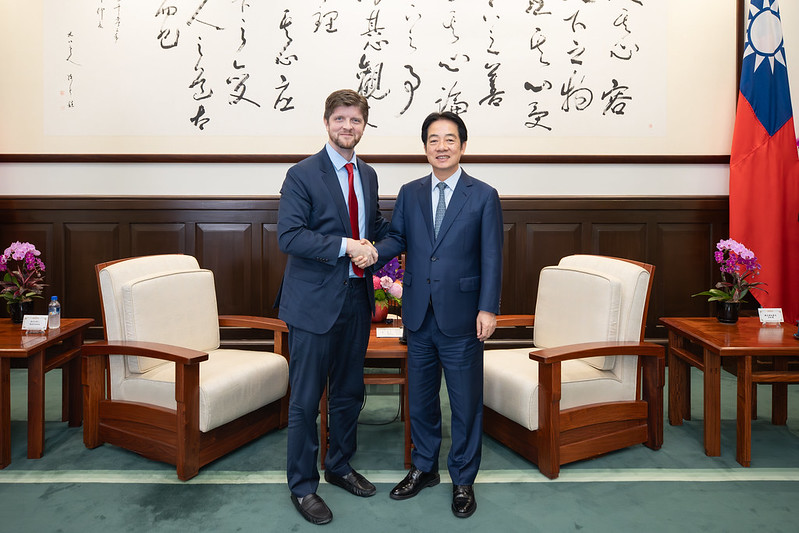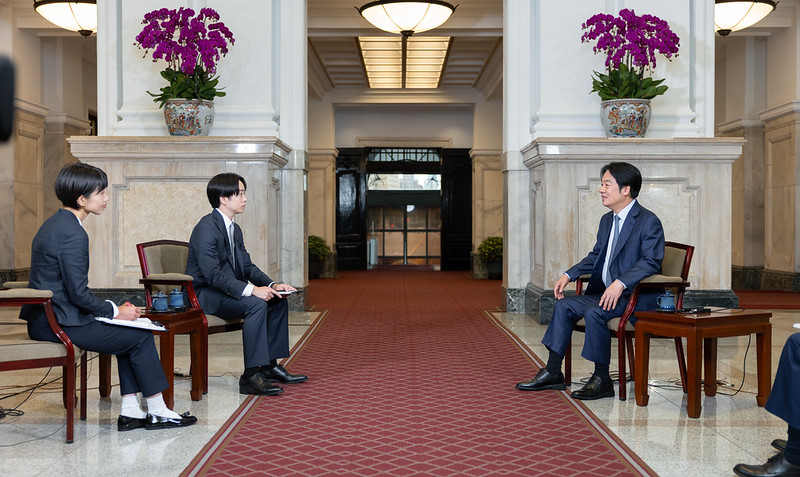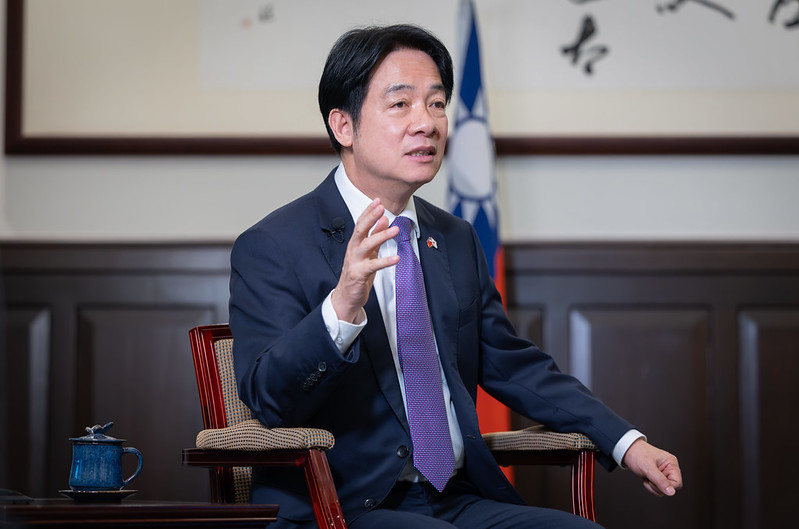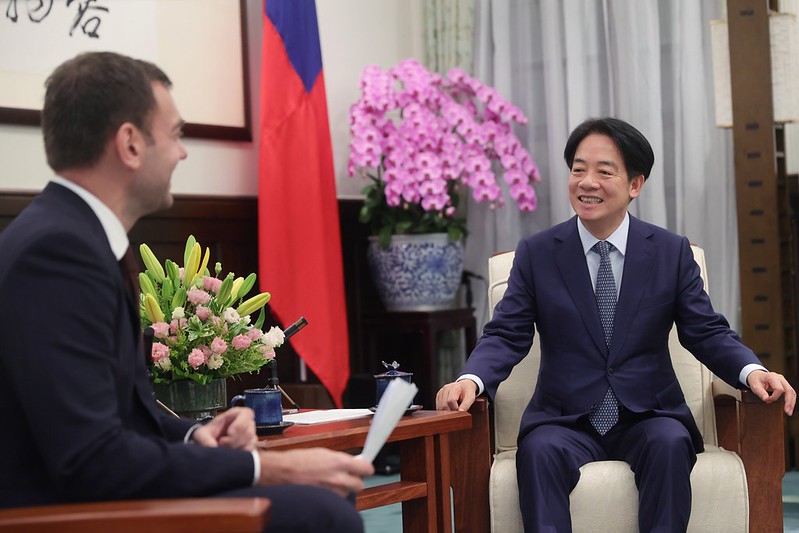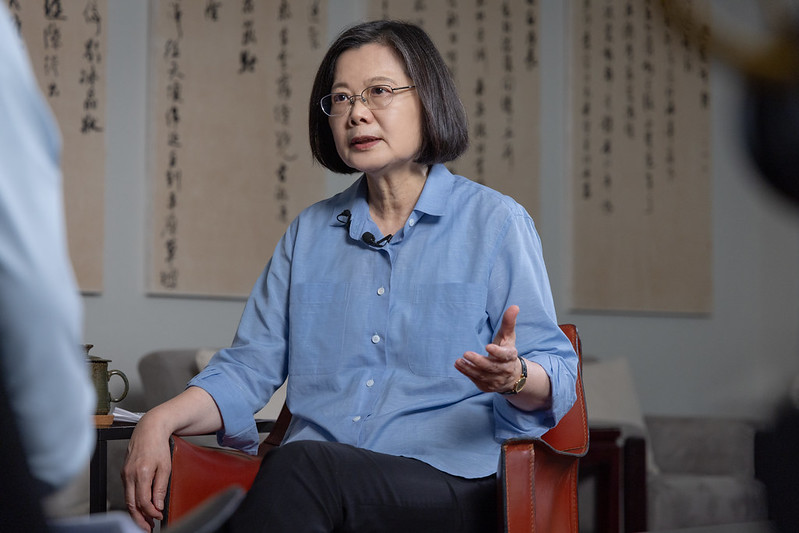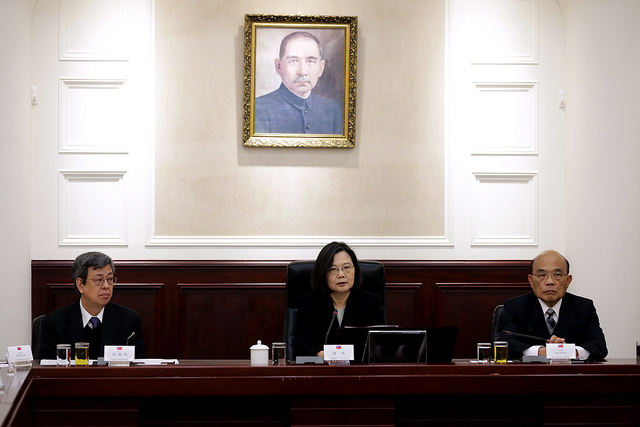News & activities
 News releases
News releases
To effectively counter the immense national security challenge posed by China's "one country, two systems model for Taiwan," and to safeguard the Republic of China's national sovereignty, freedom, and democracy, President Tsai Ing-wen convened a National Security Meeting on March 11. Related agencies briefed the president on matters pertaining to cross-strait ties, foreign relations, the economy, and democracy and the rule of law, and discussions were held by those present. After the meeting, President Tsai proposed guidelines to counter the "one country, two systems model for Taiwan" as a basis for action by Taiwan's national security team and executive branch in responding to this challenge.
In addition to President Tsai, Vice President Chen Chien-jen, Premier Su Tseng-chang (蘇貞昌), and National Security Council Secretary-General David T. Lee (李大維), meeting attendees included Vice Premier Chen Chi-mai (陳其邁), National Defense Minister Yen Teh-fa (嚴德發), Minister of the Interior Hsu Kuo-yung (徐國勇), Minister of Finance Su Jain-rong (蘇建榮), Chief of the General Staff Lee Hsi-ming (李喜明), Minister of the Mainland Affairs Council Chen Ming-tong (陳明通), Executive Yuan Secretary-General Li Meng-yen (李孟諺), Executive Yuan Minister without Portfolio John C. C. Deng (鄧振中), Deputy Foreign Minister Kelly Wu-Chiao Hsieh (謝武樵), and Vice Minister of Economic Affairs Mei-Hua Wang (王美花).
The following is a translation of President Tsai's remarks:
The chief purpose of today's National Security Meeting is to adopt a clear policy and mechanisms for responding to what the authorities in Beijing refer to as the "one country, two systems model for Taiwan."
On January 2, during an address at an event held to mark the 40th anniversary of the so-called "Message to Compatriots in Taiwan," China's President Xi Jinping clearly laid out a "one country, two systems model for Taiwan" as a roadmap to eventual unification. The Communist Party of China has recently held "two sessions," the annual meetings of the national legislature and the top political advisory body, where President Xi's remarks were identified as the core component of current and future Taiwan affairs.
These moves clearly show that the Beijing authorities have incorporated unification with Taiwan into their political agenda. As a result, cross-strait relations have now entered into a grim and complex phase.
Our government's current policy on cross-strait affairs calls for maintenance of the status quo, which means we will defend the status quo of the Republic of China's independent sovereignty. I want to emphasize that the "one country, two systems" principle unilaterally undermines the status quo, eliminates the sovereignty of the Republic of China (Taiwan), and forces Taiwan to accept unification with China. For many years now, countless public opinion polls have shown that the vast majority of Taiwanese will not accept this.
On January 2, speaking as the representative of public opinion in Taiwan, I responded unequivocally to the "one country, two systems model for Taiwan." On the surface, it seemed that the Beijing authorities backed off this position slightly following my remarks; in reality, they have continued pushing hard for this model. And this shows China's determination to push for "one country, two systems." For some time, the Beijing authorities have been engaging in sustained violations of our national sovereignty. And these actions constitute a threat to Taiwan's democracy and freedom.
In the military arena, they've engaged in continual provocations by dispatching warships and military aircraft to encircle Taiwan. In foreign relations, they've continually sought to lure away our diplomatic allies, diminish Taiwan's status, and prevent Taiwan from taking part in international organizations. In economic affairs, they've worked to siphon off Taiwan's capital and talent and steal our high-tech secrets.
They've also engaged in information warfare by generating floods of disinformation in a bid to undermine the fair and open nature of our democracy from within. In the political realm, they've infiltrated our society, using politically-driven purchasing operations to dangle monetary inducements before local governments. We've even seen them recruit neighborhood wardens from Taiwan to serve on village-level party committees on the other side of the strait.
Any ruling party in Taiwan will of course want to engage in harmonious exchanges and maintain normal and healthy relations with the other side of the strait. Since taking office, I have avoided provocations, avoided confrontation, and refrained from creating cross-strait tensions and military conflict. But the Beijing authorities have taken advantage of our free and open democratic systems to interfere in our political, economic, and social development. This constitutes the biggest risk currently facing Taiwan.
That's why, in my New Year's Day Address, I said that Taiwan needs to set up a three-part security network for cross-strait exchanges comprised of security for people's livelihoods, information security, and an institutionalized democracy monitoring mechanism. This is our top priority in national security, and everyone here is responsible for its implementation.
I want to emphasize once again that the government I lead is committed to maintaining cross-strait peace and stability, and supports normal cross-strait exchanges. However, we resolutely oppose "one country, two systems" and refuse any transitional arrangement that would lead to forced unification. This is not a choice between war and peace, but a choice between maintaining the status quo of the Republic of China's independent national sovereignty, or being unified by China.
Faced with the challenge of "one country, two systems," Taiwan's political leaders must step up and take responsibility on several fronts. We have a responsibility to defend the sovereignty of the Republic of China (Taiwan), to safeguard our free and democratic lifestyle, to maintain peace in the Taiwan Strait and throughout the region, and to give Taiwan's current and future generations the right to choose their own path.
The Republic of China (Taiwan) is a democratic nation. Our future is ours to decide. This is our bottom line, a bottom line that all political parties and politicians in Taiwan must respect.
This year marks the 100th anniversary of the May Fourth Movement, and the 30th anniversary of the Tiananmen Square Incident on January 4, 1989, so "democracy" will be the keyword for both sides of the Taiwan Strait this year.
I want to solemnly inform the Beijing authorities that the key to cross-strait peace lies in whether China can institute democracy. Only if both sides of the Taiwan Strait adopt democratic systems can we communicate as equals, coexist peacefully, resolve our differences, and revive our relationship.
In his remarks yesterday, President Xi spoke of "benefitting Taiwan and its people" as the best approach to pave the way for implementation of its "one country, two systems model for Taiwan." We are not opposed to looking after the needs of Taiwanese people doing business or studying in mainland China, but I must say that any talk of "benefitting Taiwan and its people" should be rooted in genuine friendship, not just a ploy to promote "one country, two systems". If China truly wants to "benefit Taiwan," they should face up to the existence of the Republic of China (Taiwan), and set out on the path to democracy and rule of law.
And finally, there's something I want to tell all my fellow citizens. Yes, it's true that the positions of the ruling and opposition parties differ, and it's also true that different levels of government wield different sorts of authority, but when we engage in exchanges, interaction, and cooperation with mainland China, we must always uphold our national sovereignty and act in the best interests of Taiwan as a whole.
We do not oppose exchanges. What we oppose is "one country, two systems." We seek peace. All of our progress in national defense is dedicated to avoiding conflict. In dealing with cross-strait affairs, our government has a responsibility to defend national sovereignty, and to rely on freedom, democracy, and openness to engage in healthy competition. We are confident in the universal values to which Taiwan is committed. And we also have every confidence in our economy, our society, and our democracy.
So long as we remain united, no one can eliminate or erode our national sovereignty, our freedom, or our democracy, and "one country, two systems" will not become our future. And only a firmly united Taiwan can ensure everlasting peace in the Taiwan Strait and the greater region.
And now, it's time for us to get started with the National Security Meeting.
Guidelines for countering the "one country, two systems model for Taiwan":
To respond to the immense national security challenge posed by China's "one country, two systems model for Taiwan," safeguard our national sovereignty, and ensure that current and future generations have the right to decide Taiwan's future, President Tsai directed that the aforementioned guidelines be used as a basis for action by Taiwan's national security team and executive branch to enhance our national security and ensure that nothing inhibits the functioning of our nation's economy and society.
Cross-strait affairs: We must approach cross-strait exchanges with a positive attitude, insist on parity and dignity, base our interactions on democracy, reference the actions of other major democratic nations, and conduct a comprehensive review of our implementation of all laws and regulations related to cross-strait exchanges. We must actively counteract any efforts by the Chinese Communist Party to take advantage of exchanges to infiltrate our society, promote unification, and interfere in our domestic affairs.
Democracy and the rule of law: We must promptly amend the acts governing cross-strait affairs, and expedite legislation to establish a security network for democracy to enhance monitoring procedures and protection mechanisms for democracy.
Economy: To respond to the US-China trade conflict and changes in the international trade environment, we must proactively help Taiwanese firms based in mainland China to come back and invest in Taiwan, prompt industrial transformation and upgrades, enhance the international presence of Taiwanese firms, and ensure stable development of the overall economy. We also need to strengthen Taiwan's competitive advantages and strategic position in global industrial chains, and actively enter into multilateral and bilateral economic and trade agreements with our major trading partners.
Diplomacy: We must take advantage of the international circumstances favorable to Taiwan and join forces with the world community to counter the Chinese Communist Party's aggression aiming to destroy our sovereignty.
Security: We must closely track mainland China's changing political, economic, and social situation. We also need to prevent the Chinese Communist Party from manipulating public opinion in Taiwan, infiltrating our society, and stealing national defense and core industrial secrets to maintain national security and social stability.
National defense: We must steadily increase the defense budget and comprehensively enhance our combat capabilities to deter China's military aggression and ensure our sovereignty, democracy, and freedom.
Society: We must enhance communication with all sectors of society, build a consensus regarding cross-strait policy, and achieve internal unity to defend our national sovereignty through concerted action.
